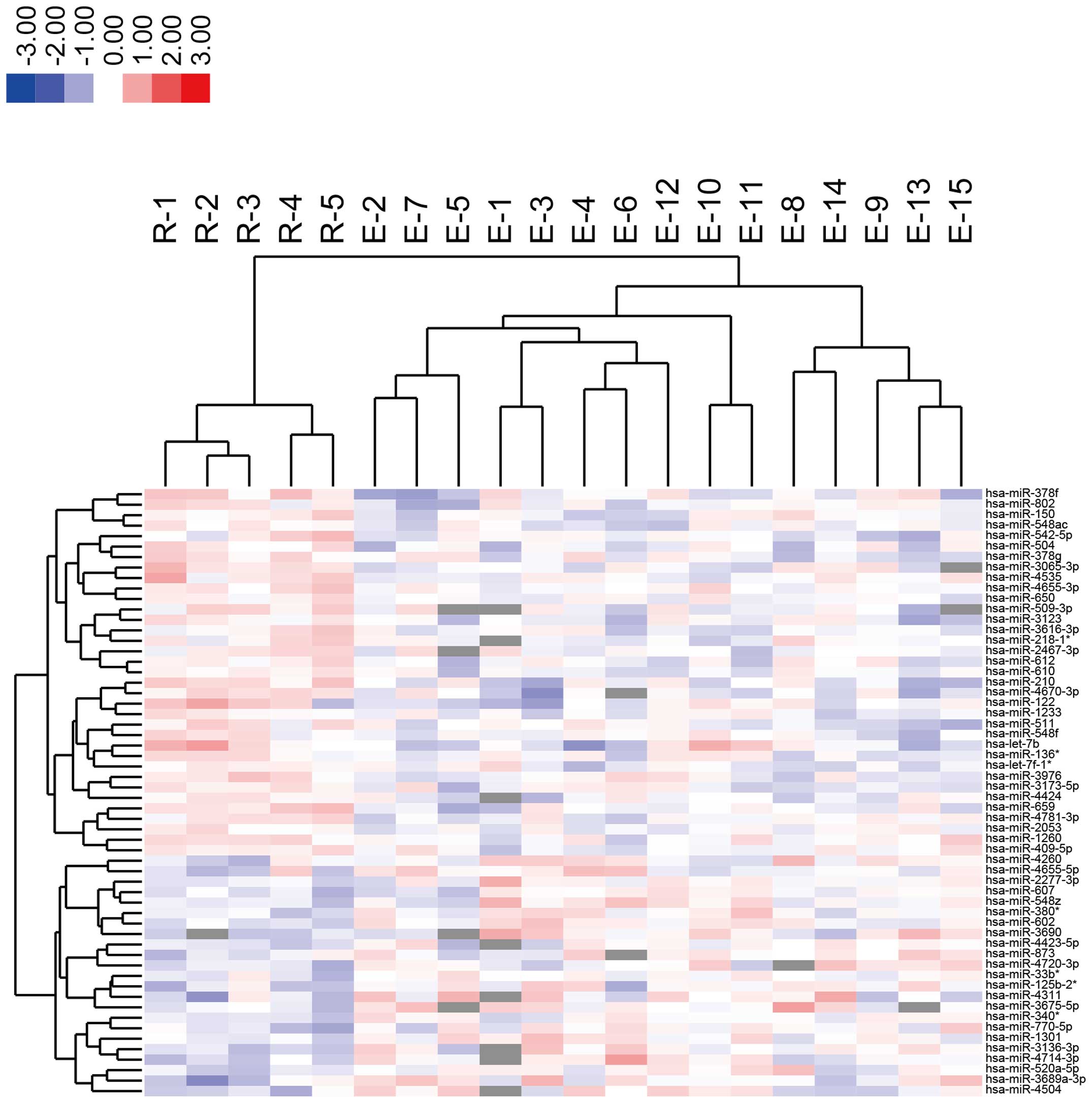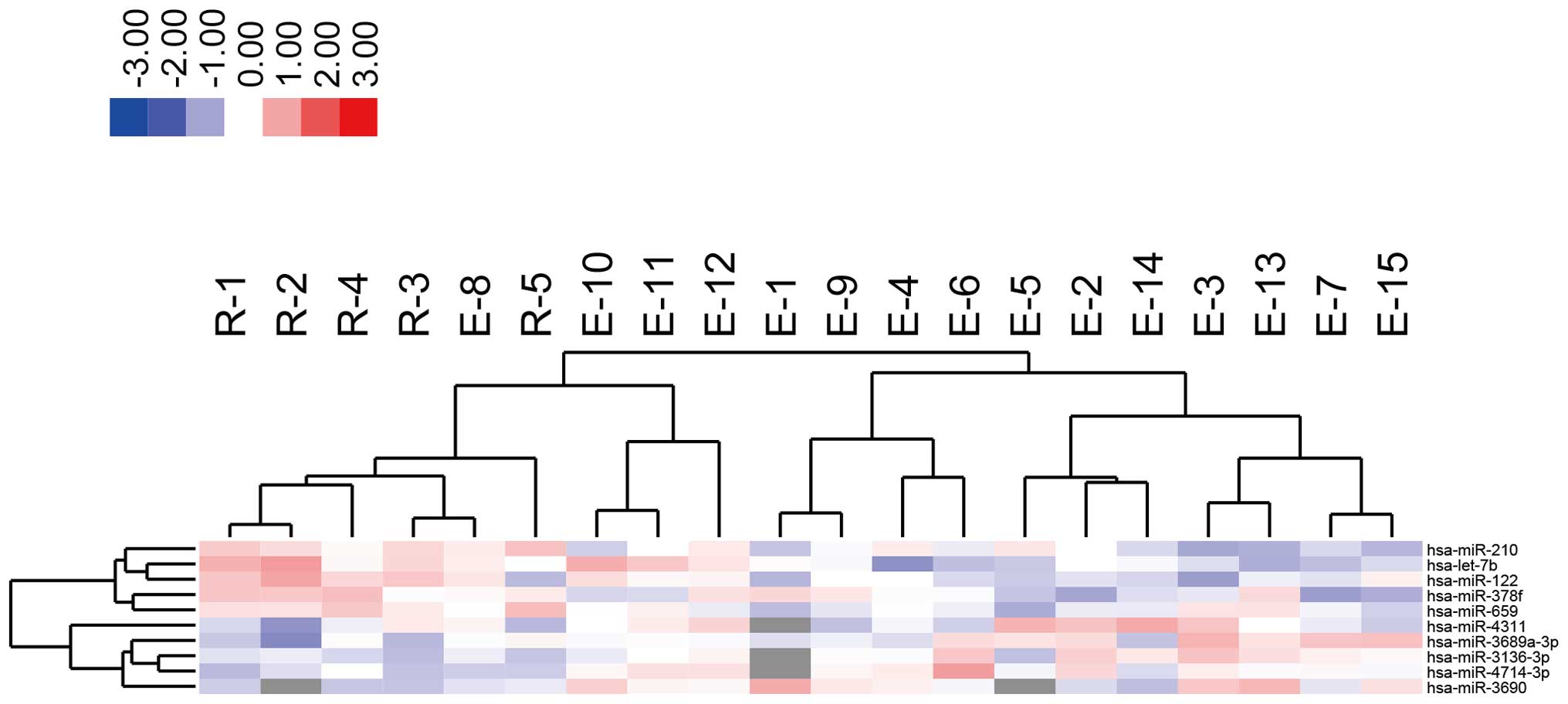|
1
|
Morishita A and Masaki T: miRNA in
hepatocellular carcinoma. Hepatol Res. 45:128–141. 2015. View Article : Google Scholar
|
|
2
|
Suzuki H, Maruyama R, Yamamoto E and Kai
M: Epigenetic alteration and microRNA dysregulation in cancer.
Front Genet. 4:2582013. View Article : Google Scholar : PubMed/NCBI
|
|
3
|
Bartel DP: MicroRNAs: Genomics,
biogenesis, mechanism, and function. Cell. 116:281–297. 2004.
View Article : Google Scholar : PubMed/NCBI
|
|
4
|
Krek A, Grün D, Poy MN, Wolf R, Rosenberg
L, Epstein EJ, MacMenamin P, da Piedade I, Gunsalus KC, Stoffel M
and Rajewsky N: Combinatorial microRNA target predictions. Nat
Genet. 37:495–500. 2005. View
Article : Google Scholar : PubMed/NCBI
|
|
5
|
Griffiths-Jones S: miRBase: MicroRNA
sequences and annotation. Curr Protoc Bioinformatics. Chapter 12,
Unit 12. 19:1–10. 2010.
|
|
6
|
Iborra M, Bernuzzi F, Invernizzi P and
Danese S: MicroRNAs in autoimmunity and inflammatory bowel disease:
Crucial regulators in immune response. Autoimmun Rev. 11:305–314.
2012. View Article : Google Scholar
|
|
7
|
Dai Y, Huang YS, Tang M, Lv TY, Hu CX, Tan
YH, Xu ZM and Yin YB: Microarray analysis of microRNA expression in
peripheral blood cells of systemic lupus erythematosus patients.
Lupus. 16:939–946. 2007. View Article : Google Scholar : PubMed/NCBI
|
|
8
|
Pauley KM, Satoh M, Chan AL, Bubb MR,
Reeves WH and Chan EK: Upregulated miR-146a expression in
peripheral blood mononuclear cells from rheumatoid arthritis
patients. Arthritis Res Ther. 10:R1012008. View Article : Google Scholar : PubMed/NCBI
|
|
9
|
Neilson JR, Zheng GX, Burge CB and Sharp
PA: Dynamic regulation of miRNA expression in ordered stages of
cellular development. Genes Deve. 21:578–589. 2007. View Article : Google Scholar
|
|
10
|
Wu H, Neilson JR, Kumar P, Manocha M,
Shankar P, Sharp PA and Manjunath N: MiRNA profiling of naive,
effector and memory CD8 T cells. PloS One. 2:e10202007. View Article : Google Scholar
|
|
11
|
Zhou B, Wang S, Mayr C, Bartel DP and
Lodish HF: miR-150, a microRNA expressed in mature B and T cells,
blocks early B cell development when expressed prematurely. Proc
Natl Acad Sci USA. 104:7080–7085. 2007. View Article : Google Scholar : PubMed/NCBI
|
|
12
|
Kaplan MM and Gershwin ME: Primary biliary
cirrhosis. N Engl J Med. 353:1261–1273. 2005. View Article : Google Scholar : PubMed/NCBI
|
|
13
|
Shimoda S, Harada K, Niiro H, Shirabe K,
Taketomi A, Maehara Y, Tsuneyama K, Nakanuma Y, Leung P, Ansari AA,
et al: Interaction between Toll-like receptors and natural killer
cells in the destruction of bile ducts in primary biliary
cirrhosis. Hepatology. 53:1270–1281. 2011. View Article : Google Scholar : PubMed/NCBI
|
|
14
|
Hirschfield GM and Gershwin ME: The
immunobiology and pathophysiology of primary biliary cirrhosis.
Annu Rev Pathol. 8:303–330. 2013. View Article : Google Scholar : PubMed/NCBI
|
|
15
|
Corpechot C, Chazouillères O and Poupon R:
Early primary biliary cirrhosis: Biochemical response to treatment
and prediction of long-term outcome. J Hepatol. 55:1361–1367. 2011.
View Article : Google Scholar : PubMed/NCBI
|
|
16
|
Tanaka A, Hirohara J, Nakanuma Y,
Tsubouchi H and Takikawa H: Biochemical responses to bezafibrate
improve long-term outcome in asymptomatic patients with primary
biliary cirrhosis refractory to UDCA. J Gastroenterol. 50:675–682.
2015. View Article : Google Scholar
|
|
17
|
Padgett KA, Lan RY, Leung PC, Lleo A,
Dawson K, Pfeiff J, Mao TK, Coppel RL, Ansari AA and Gershwin ME:
Primary biliary cirrhosis is associated with altered hepatic
microRNA expression. J Autoimmun. 32:246–253. 2009. View Article : Google Scholar : PubMed/NCBI
|
|
18
|
Chen X, Ba Y, Ma L, Cai X, Yin Y, Wang K,
Guo J, Zhang Y, Chen J, Guo X, et al: Characterization of microRNAs
in serum: A novel class of biomarkers for diagnosis of cancer and
other diseases. Cell Res. 18:997–1006. 2008. View Article : Google Scholar : PubMed/NCBI
|
|
19
|
Poupon R: Primary biliary cirrhosis: A
2010 update. J Hepatol. 52:745–758. 2010. View Article : Google Scholar : PubMed/NCBI
|
|
20
|
Corpechot C, Abenavoli L, Rabahi N,
Chrétien Y, Andréani T, Johanet C, Chazouillères O and Poupon R:
Biochemical response to ursodeoxycholic acid and long-term
prognosis in primary biliary cirrhosis. Hepatology. 48:871–877.
2008. View Article : Google Scholar : PubMed/NCBI
|
|
21
|
Kuiper EM, Hansen BE, de Vries RA, den
Ouden-Muller JW, van Ditzhuijsen TJ, Haagsma EB, Houben MH,
Witteman BJ, van Erpecum KJ and van Buuren HR; Dutch PBC Study
Group: Improved prognosis of patients with primary biliary
cirrhosis that have a biochemical response to ursodeoxycholic acid.
Gastroenterology. 136:1281–1287. 2009. View Article : Google Scholar : PubMed/NCBI
|
|
22
|
Pares A, Caballería L and Rodes J:
Excellent long-term survival in patients with primary biliary
cirrhosis and biochemical response to ursodeoxycholic Acid.
Gastroenterology. 130:715–720. 2006. View Article : Google Scholar : PubMed/NCBI
|
|
23
|
Roderburg C, Benz F, Vargas Cardenas D,
Koch A, Janssen J, Vucur M, Gautheron J, Schneider AT, Koppe C,
Kreggenwinkel K, et al: Elevated miR-122 serum levels are an
independent marker of liver injury in inflammatory diseases. Liver
Int. 35:1172–1184. 2015. View Article : Google Scholar
|
|
24
|
Bihrer V, Friedrich-Rust M, Kronenberger
B, Forestier N, Haupenthal J, Shi Y, Peveling-Oberhag J, Radeke HH,
Sarrazin C, Herrmann E, et al: Serum miR-122 as a biomarker of
necroinflammation in patients with chronic hepatitis C virus
infection. Am J Gastroenterol. 106:1663–1669. 2011. View Article : Google Scholar : PubMed/NCBI
|
|
25
|
D'Alessandra Y, Devanna P, Limana F,
Straino S, Di Carlo A, Brambilla PG, Rubino M, Carena MC,
Spazzafumo L, De Simone M, et al: Circulating microRNAs are new and
sensitive biomarkers of myocardial infarction. Eur Heart J.
31:2765–2773. 2010. View Article : Google Scholar : PubMed/NCBI
|
|
26
|
Zhang H, Su Y, Xu F, Kong J, Yu H and Qian
B: Circulating microRNAs in relation to EGFR status and survival of
lung adenocarcinoma in female non-smokers. PloS One. 8:e814082013.
View Article : Google Scholar : PubMed/NCBI
|
|
27
|
Mayr C, Hemann MT and Bartel DP:
Disrupting the pairing between let-7 and Hmga2 enhances oncogenic
transformation. Science. 315:1576–1579. 2007. View Article : Google Scholar : PubMed/NCBI
|
|
28
|
He J, Wu J, Xu N, Xie W, Li M, Li J, Jiang
Y, Yang BB and Zhang Y: MiR-210 disturbs mitotic progression
through regulating a group of mitosis-related genes. Nucleic Acids
Res. 41:498–508. 2013. View Article : Google Scholar :
|
|
29
|
Han K, Zhao T, Chen X, Bian N, Yang T, Ma
Q, Cai C, Fan Q, Zhou Y and Ma B: microRNA-194 suppresses
osteosarcoma cell proliferation and metastasis in vitro and in vivo
by targeting CDH2 and IGF1R. Int J Oncol. 45:1437–1449.
2014.PubMed/NCBI
|
|
30
|
Swarbrick A, Woods SL, Shaw A,
Balakrishnan A, Phua Y, Nguyen A, Chanthery Y, Lim L, Ashton LJ,
Judson RL, et al: miR-380-5p represses p53 to control cellular
survival and is associated with poor outcome in MYCN-amplified
neuroblastoma. Nat Med. 16:1134–1140. 2010. View Article : Google Scholar : PubMed/NCBI
|
|
31
|
Le MT, Teh C, Shyh-Chang N, Xie H, Zhou B,
Korzh V, Lodish HF and Lim B: MicroRNA-125b is a novel negative
regulator of p53. Genes Dev. 23:862–876. 2009. View Article : Google Scholar : PubMed/NCBI
|
|
32
|
Yang L, Ma Z, Wang D, Zhao W, Chen L and
Wang G: MicroRNA-602 regulating tumor suppressive gene RASSF1A is
overexpressed in hepatitis B virus-infected liver and
hepatocellular carcinoma. Cancer Biol Ther. 9:803–808. 2010.
View Article : Google Scholar : PubMed/NCBI
|
|
33
|
Rukov JL, Wilentzik R, Jaffe I, Vinther J
and Shomron N: Pharmaco-miR: Linking microRNAs and drug effects.
Brief Bioinform. 15:648–659. 2014. View Article : Google Scholar :
|
















